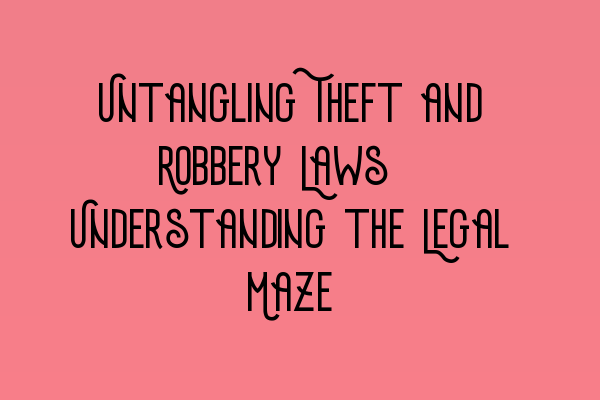Untangling Theft and Robbery Laws: Understanding the Legal Maze
When it comes to theft and robbery, understanding the legal distinctions between these two offenses can be like navigating a complex maze. Both crimes involve the unauthorized taking of someone else’s property, but the specifics of each offense vary considerably under UK law. In this article, we’ll delve into the nuances of theft and robbery laws, demystifying the legal terminology and shedding light on the elements that differentiate these offenses.
Before we go any further, let’s clarify the related terms to avoid any confusion. Theft and robbery are distinct offenses, but they also fall under the broader umbrella of property crimes. While both offenses involve the unlawful acquisition of someone’s property, they differ in terms of force, intimidation, and the circumstances surrounding the act.
Theft: A Crime of Dishonesty
Business Regulations in the UK
Theft is a criminal offense that encompasses a wide range of wrongful acts. In simple terms, theft occurs when someone intentionally takes another person’s property without their consent and with the intention of permanently depriving them of their ownership rights. This offense typically involves dishonesty rather than direct confrontations or violence.
For an act to be considered theft, three essential elements must be present: the appropriation of property, the property belongs to another party, and the intention to permanently deprive the owner of their property. These elements ensure that theft encompasses the fraudulent acquisition of property, regardless of the value of the stolen items.
It’s worth noting that theft can occur in various forms, ranging from shoplifting to embezzlement and fraud. It’s a highly nuanced offense that requires careful analysis of the circumstances and the intent of the individual involved. Therefore, it’s crucial to consult with a qualified legal professional who can guide you through the intricacies of theft laws.
Robbery: A Crime of Force or Fear
SQE Exam Prep: Essential Study Materials for Aspiring Solicitors
Unlike theft, robbery involves not only the unlawful taking of someone’s property but also the use of force or fear to accomplish the act. Robbery is considered a more serious offense due to its violent nature and the potential harm it poses to victims. The presence of force or intimidation distinguishes robbery from other property offenses and makes it a particularly heinous crime.
In order to establish a case of robbery, several key elements must be proved beyond a reasonable doubt. These include the unlawful taking and carrying away of another person’s property, the presence of force or threat of force, and the intention to permanently deprive the owner of their property. It’s important to note that even the mere threat of force can elevate a theft to a robbery, as long as it instills fear in the victim.
Robbery offenses can take various forms, such as armed robbery, mugging, or home invasion. Each case requires careful examination of the evidence and the specific circumstances surrounding the offense. If you find yourself facing robbery charges or if you believe you have been a victim of robbery, it’s imperative to seek legal counsel immediately to protect your rights and obtain the best possible outcome.
Key Differences and Similarities
Demystifying the Solicitors Qualifying Examination Format
LLC Formation Made Simple: Step-by-Step Guide for UK Entrepreneurs
LLC Formation: A Step-by-Step Guide for UK Entrepreneurs
While theft and robbery share the common element of unlawfully taking someone’s property, the key difference lies in the means by which the offense is committed. Theft typically involves stealth, deception, or dishonesty, whereas robbery employs force, intimidation, or threats to accomplish the act.
Another notable difference is the severity of the offenses. Robbery is considered a more serious crime than theft due to the inclusion of violence or the threat of violence. The penalties for robbery convictions are generally more severe, reflecting the increased harm caused to the victims and the broader potential for danger inherent in these cases.
That being said, both theft and robbery have serious legal consequences, and individuals accused of these offenses should seek legal representation without delay. An experienced criminal defense solicitor can navigate the legal complexities of these crimes, scrutinize evidence, and build a robust defense tailored to your specific case.
In Conclusion
Understanding the distinctions between theft and robbery is crucial for both legal professionals and the general public. While theft involves dishonesty and the intent to permanently deprive someone of their property, robbery adds an element of force or fear to the equation. By grasping these legal nuances, you can better protect your rights, make informed decisions, and seek appropriate legal action when necessary.
If you require legal assistance or have questions regarding theft or robbery laws, please reach out to our team at SQE Criminal Law & Practice Law UK. Our experienced solicitors are well-versed in criminal defense and can provide the guidance and representation you need.
